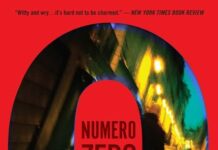
Ebook Info
- Published: 2007
- Number of pages: 642 pages
- Format: EPUB
- File Size: 1.89 MB
- Authors: Umberto Eco
Description
A literary prank leads to deadly danger in this “endlessly diverting” intellectual thriller by the author of The Name of the Rose (Time). Bored with their work, three Milanese book editors cook up an elaborate hoax that connects the medieval Knights Templar with occult groups across the centuries. Becoming obsessed with their own creation, they produce a map indicating the geographical point from which all the powers of the earth can be controlled—a point located in Paris, France, at Foucault’s Pendulum. But in a fateful turn the joke becomes all too real. When occult groups, including Satanists, get wind of the Plan, they go so far as to kill one of the editors in their quest to gain control of the earth. Orchestrating these and other diverse characters into his multilayered semiotic adventure, Umberto Eco has created a superb cerebral entertainment. “An intellectual adventure story…sensational, thrilling, and packed with arcana.”—The Washington Post Book World
User’s Reviews
Reviews from Amazon users which were colected at the time this book was published on the website:
⭐Now we know where Dan Brown stole all his ideas. The primary difference between the two books is readability. Brown’s a barn-storming page turner and Foucault’s Pendulum makes you want to burn every barn on the planet that contains a copy of the book. The name-dropping trivia makes you so numb it might make a forced reading a valid Guantanamo torture strategy. I get that it was written by an Italian who was living in Italy, but 98% of the names and other pronouns referenced in the book could be dropped and the story wouldn’t change an iota. Its like author wanted to show off his research skills; but instead, he just ends up with a mind-boggling boring book.
⭐Very funny in numerous ways. The reader of 2018 is likely to have encountered confusing, multifarious and mutually contradictory tidbits of arcana regarding matters esoteric, occultic, conspiratorial, sceptical, academic, and/or historical. On Youtube, no doubt. Eco has swept up whatever you may have encountered—and much more—in a compelling narrative with raveling threads centered around three jaundiced editorial employees in a Milanese publisher. Eco lures— no, beguiles— his reader up and back along a way resplendent with traps, reversals, historiomancy, inversions, conversions and diversions. In summary: droll, very droll.
⭐A masterpiece. When Eco passed away this year, I decided to go back to the one I had always meant to read but never got around to. It’s every bit as challenging and as fascinating as I thought it would be. I read it with a Kindle, so I was able to highlight the foreign phrases and get an instant translation. I may want to go back to Baudolino or Name of the Rose to do the same.By the way, I’m surprised Dan Brown was able to get away with how much he borrowed from this for his DaVinci Code book.
⭐Found the book disappointing. Over 600 pages that should have been edited to half that length. Middle section filled with Eco’s research on the occult most of which read like research told because he had the information not because it was inherent to the story. Then after 500 pages all the action is resolved in the last 100 pages. The idea of the book is intriguing but not well executed!
⭐Eco’s brilliance is in placing interesting, introspective characters in the most elaborate traps, often of their own making, and playing out the real person’s reaction to surreal events.The story unfolds methodically, and just like the characters, the reader thinks, ah, what a coincidence. Or maybe what if that other thing happened? But it does; it always does, and with rhythmic precision that the whole world descends on our poor protagonists’ heads, with reader and character alike left with nothing but to admire the trap.
⭐I love this book precisely because of the inaccessibility of the lexicon Eco uses. It’s hard to read, but I got it on Kindle and used the dictionary whenever I could to define terms that existed, and that made the narrative far more accessible to me. It is a parody, tongue in cheek, poking fun at every conspiracy theorist, and he does it with class, wit, and style. Some have called Eco pretentious, and perhaps that’s a truth, and I feel a bit smaller intellectually when I read Eco because his intellect is vast, as is his education. I understand only a little Latin, French, and Italian, yet that very fact only seems to add to the mystical aura of the story that Causabon tells. It’s all for fun. I found myself wishing I had a place like Pilade’s, where I could engage in highly intellectual conversation with other educated individuals. If you are daunted by dense prose, or a lexicon that might be filled with too many obscure words, perhaps you should give it a pass. If, however, you are stimulated by the same, go for it. It’s worth it. It’s a great novel, and I appreciate seeing Eco’s literary theories at play here. I am a big fan of his essays, and I also find deconstruction, semiotics, and literary criticism in general endlessly fascinating. This book is right up my alley. Eco rules!
⭐Eco spins a complex tale around the history and possible current existence of the Knights Templar, using interesting characters, dialogue, and locations. The book is creative and generally enjoyable, but the story rather plods-on and becomes tedious in many chapters, with asides and diversions that can be distracting. Eco has great command of history and is clearly very literate, but he suffers somewhat from writer’s hubris, seemingly including text mostly because he can rather than it being essential to the story. I mildly recommend this book.
⭐I’ve read this book twice now and still find it one of the most exciting mysteries I’ve ever read. There’s lots of information in a historical mystical sense. The late Mr. Eco went all out researching the subject, so as far as historical accuracy and continuity goes, Dan Brown, eat your heart out.
⭐This is a wonderful sideswipe at the conspiracies found in fiction like Dan Brown and “fact” like the Holy Blood and the Holy Grail.It shows what someone who understands the background to these stories can do with them, creating the conspiracy to end all conspiracies.You have to let yourself go with the flow of the book, don’t try and second guess the plot (even if you’re right it’s irrelevant), see where you get taken, look at the sites on the way.It is also very funny.
⭐I enjoyed this novel as a teenager but rereading it (in my 60’s) has not been rewarding. There’s an interesting idea in there but it drags on & on with lots of name dropping & references and very little actual insight or development. The characters are one dimensional and don’t act (or speak) like real people, the motivations come out of nowhere and the action makes no sense. Sad.
⭐Ephemeral and prolix satire on the perils of esoteric and hermeneutic learning that provides more in conception than it delivers in substance, but which, for all its coincidences and non sequiturs, remains an entertaining musing on the adage that a little learning is a dangerous thing, while simultaneously proving that an intellectual author’s excessive learning when displayed on too grand a scale does not necessarily result in an entirely coherent or satisfying narrative.
⭐How does it end? Why can’t I find a film about this book. I would cast Tom cruise as the elderly athlete, Dwayne Johnson as everything else with Jason statham in the wig shop. I wish Sandra bullock was younger. And Rihanna was thinner, with a smaller forehead. With a soundtrack by Terence Trent Darby and limp biscuit. Yup
⭐As a braille proofreader, I tend to come across a lot of bad writing. Mary Higgins Clark falls into this category.There are several problems, as I see it, with the writing of this book. One is the way Clark handles thought processes. This is not an example from the book, but illustrates my point:Wow, thought Jean, It still amazes me that, as a girl growing up with two parents who hated each other, thus not affording me the loving environment one feels children should have, and given the horror of discovering the man I loved was dead, both of which must have scarred me severely emotionally … And so on. The past is told through thought, and it just seems inauthentic to me.Another problem I had was with the ending itself. I will not reveal it, but with a good mystery, the reader is left thinking, “I should have figured that out.” This is not the case with Nighttime. In the case of this book, the author seems to have (badly) penned a story, and at the end just picked one character whom she decided would be the murderer. Rather than provide clues to lead readers to the murderer, all she did was mislead and provide a few dead ends.It’s a bad writing style, it assumes no intelligence on the part of the reader, and I do not recommend it.
Keywords
Free Download Foucault’s Pendulum in EPUB format
Foucault’s Pendulum EPUB Free Download
Download Foucault’s Pendulum 2007 EPUB Free
Foucault’s Pendulum 2007 EPUB Free Download
Download Foucault’s Pendulum EPUB
Free Download Ebook Foucault’s Pendulum


